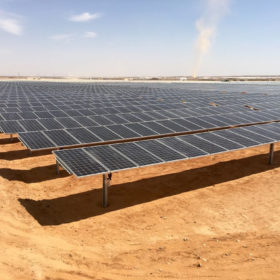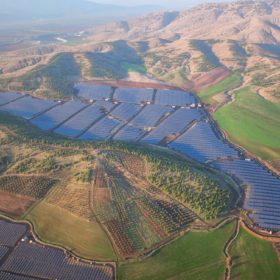Spanish PV resurgence? Not on the horizon
Reports that Spain is heading towards a renewable energy revival by 2020 have spread, leaving investors rather puzzled: is this true, and how come a government that has previously tried to eliminate energy investments is now suddenly planning to lead a renewable resurgance? pv magazine provides a more realistic appraisal.
UK investors await CfD auction results
First bids for the controversial new renewables subsidy scheme received. Successful applicants to be identified on Feb 20.
Croatia pulls plug on PV licenses
PV investors in Croatia rush to install their projects before their licenses expire.
Jordan’s solar tender bears fruit
Interest in the MENA country’s burgeoning solar PV sector attracts Japanese finance as modest plans unveiled.
Turkey aims for 3 GW of PV by 2023
In 2014, Turkey saved $850 million in energy imports due to the increase in the share of renewable energy.
Grid flexibility to integrate renewables in Europe
A new study titled Managing Flexibility in European Electricity Grids by Frost and Sullivan finds that grid flexibility is crucial to integrate renewable energy sources in Europe. Technical, geographical, managerial and above all political obstacles remain though.
Cyprus military base powered by solar
Cypriot government has signed a contract with a consortium of companies to develop the 5 MW, $7.5m project. The scheme is the first under the Go Green military initiative.
Greece applies generous net-metering
The Greek government has introduced legislation to facilitate net metering for solar PV arrays. To reward the PV sector for the delay in the policy, Greece has designed a generous net-metering scheme allowing installations up to 500 KW. Is the new law able to kick-start the idle Greek PV sector?
Emerging markets 2015: Will Israel’s PV take off?
Despite the encouraging news coming lately from other Middle Eastern markets, Israel remains the region’s most hopeful case for solar PV development. But will Israel seriously decide to boost its photovoltaic sector in 2015? Or are we set for yet another year of generally positive installations but nothing close to what Israel could or should achieve?
Emerging markets 2015: reason for optimism in Indonesia
The election of Joko Widodo to Indonesia’s presidency in July was met by Indonesians with optimism that his government will direct funds towards health care, education and infrastructure investments. President Widodo’s decision in November to slash the fuel subsidies in particular provided the energy industry with optimism that a new era may be dawning for renewables including solar PV in the populous nation.




